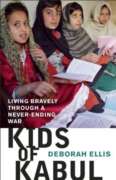
Kids of Kabul: Living Bravely Through a Never-Ending War
Written by Deborah Ellis
Groundwood Books, 2012, 143 pp.
ISBN: 978-1554981816
Heartache, poverty, pain, hunger, children growing up before their time, and the loss of family members are only some of the tragedies that Afghanistan’s children are continuing to experience since the fall of the Taliban in 2001. More than two dozen children share stories of their lives in Deborah Ellis’s Kids of Kabul. Children relay their hopes and dreams of going to school and becoming doctors or teachers to make the world a better place. Many interviewed have not had the chance to attend schools as they have lost their father and/or mother, forcing these young teens to work to support their families.
Feminist Deborah Ellis believes that men and women are equal, unlike how many females are regarded in Afghanistan, even to this day. Women are beaten or treated poorly. Many females do not go to school because they work to help support their families since there is no father to help. Girls who want to attend schools are often made fun of by male family members. Without an education, females will continue to live in poverty.
Born and raised in Canada, Deborah Ellis has traveled to many places around the world, not just to visit but also to make a difference. As she has spent most of her life as an activist, one important cause is exhibited in her non-fiction book, Kids of Kabul. Her passion for children and women’s rights in Afghanistan is evident as she donates all of the proceeds from this book to her organization: Canadian Women for Women in Afghanistan. This money goes to help women and children by supporting schools, libraries, and literacy programs.
Multi-award winning Deborah Ellis has written twenty books which have been translated into over 25 languages. Most of the royalties from her books are donated to charitable organizations. For example, from her first two books from the Breadwinner Series trilogy, she has donated over $1 million dollars to Canadian Women for Women in Afghanistan, which helps fund the education and quality of living for females. In addition, the royalties from the final book from the acclaimed trilogy, Mud Cities, raised thousands of dollars that were donated to Street Kids International. Her perseverance to help underprivileged families is what drives her passion as she continues to travel and write.
The authenticity of this story is overwhelmingly easy to access as violence, death, and poverty continues in the country of Afghanistan. Many children still live in the war torn streets, struggling through economic difficulties and are even the breadwinners for their families. At least 30% of Afghan children ages 5-14 are working in some form. First-hand accounts of children weaving rugs, collecting firewood, shining shoes, selling items, begging for food, and even digging in trash dumps to provide for their families are authentic representations discussed throughout the text and in the news.
This book serves as a great teaching tool for middle school or high school students by highlighting the lives of these specific children in Afghanistan. Additionally, creating book study groups or teacher guided discussions on poverty, loss of a family member, hunger, and hope for the future would deepen the lessons learned from this novel as Ellis brings awareness to the forefront and, hopefully, promotes action among its readers.
Kids of Kabul might be paired with The Roses in My Carpets by Rukhsana Khan (2004), the story of a young refugee from Afghanistan living with terrifying memories. Overcome by thirst, hunger, and mud he continues to dream of freedom. Both books tell about poverty, hunger and the hope of a better future and would pair together well in a middle school or high school setting.
Cathy Stearns, University of North Texas, Denton, TX
WOW Review, Volume VI, Issue 1 by Worlds of Words is licensed under a Creative Commons Attribution-NonCommercial-ShareAlike 4.0 International License. Based on work at https://wowlit.org/on-line-publications/review/vi-1/

Dear Ms. Wilson,
I would be grateful for some details – which are the facts that I neglected to look up, specifically on Wikipedia?
The novel was written in 2005 and I consulted countless books and other media in order to describe two Jewish families in the 1930s and 1940s as credibly as possible. A good deal of the two years of writing this novel (the German original being much longer than the American edition) was spent on research in Berlin and London. Before going into print, the finished novel was read and approved by two scholars with a degree in Judaism. One of them spent most of her life in Israel.
I am very sorry for any mistake which remained in the book, also for maybe not quite catching the spirit of being Jewish in Britain in the 1940s.
With best wishes,
Anne Voorhoeve